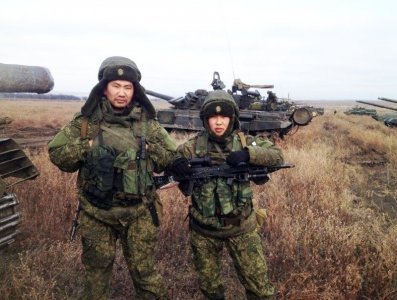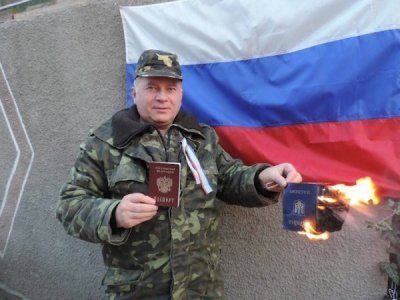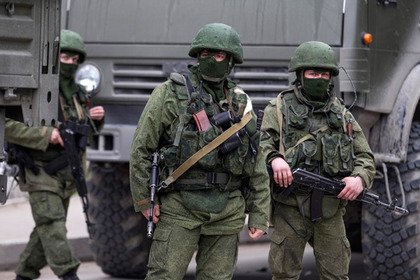Evgeniya Goryunova
The shorthand report of the RNBO meeting dated February 28, 2014, where the fate of Crimea was discussed, was declassified in Ukraine. The participants of the meeting offered different options – starting from imposing the martial law to the negotiations with the local “elite”. Could Ukraine at the moment to keep the Crimea?
The threat of Russian invasion
The first and most important reason why Ukraine didn’t maintain resistance to Russian troops in Crimea is the threat of a full-scale war with Russia, to which the country was absolutely not ready. Igor Tenyukh, who was the acting Minister of Defence at that time, confirms this fact referring to the threats of the Russian Black Sea Fleet commander Alexander Vitko as well as the Verkhovna Rada chairman Alexander Turchinov does when telling about his conversation with the Speaker of the Russian State Duma Sergey Naryshkin to the Security Council members.
“Naryshkin warned me about the threats from Putin. He said that they left open the possibility of heavy military operations against Ukraine for the prosecution of Russians. Probably, they imply the taking a decision on bringing troops not only in Crimea,” Turchinov said.

The Russian military in Crimea
The units of the Russian Federation Armed Forces put on a military alert confirmed the serious plans of Russians on starting the war with Ukraine. 38 thousand soldiers, 761 armored fighting vehicles, 2200 armored vehicles, 720 artillery and firing weapon systems, 40 attack helicopters and 90 combatant helicopters and 90 attack aircrafts were reconcentrated near the Ukrainian border in the line of Kiev, Kharkov and Donetsk. According to Tenyukh, in case of the military aggression of Russia against Ukraine, the Russian tanks could reach Kiev in a few hours. But they, actually, didn’t have the forces to protect the capital.
However, Tenyukh either played cunning at the Security Council’s meeting or wasn’t aware of the number of Ukrainian troops in Crimea. According to him, there were 15 thousand Ukrainian military on the peninsula, while according to the official data, the Crimean group numbered 20.3 thousand soldiers. However, in any case, most of the military stationed in Crimea were not ready to provide resistance to the aggressor that was not considered to be as such.
Demoralization and betrayal
The second reason for surrendering Crimea is demoralization that gradually turned into betrayal. The military was waiting for the orders from Kiev but there was no one. At the same time, uniformed green men stood near their military barracks and their emissaries offered to serve for a “new fatherland” along with a good salary.
“The Russian contracts were brought for the meeting. They were shown to the officers: “Here are the Russian contracts, they promise us this salary and an immediate citizenship”, the Marine Viktor Svetlov who remained faithful to his oath speaks about the events.

A Ukrainian military burns down the passport of the citizen of Ukraine
Unfortunately, it turned out that there were not so many such people. For example, the Military Prosecutor’s Office speaks about 8000 Crimean soldiers, who joined the Russian army. There is a juridical investigation carried out against 3000 military from Crimea.
However, when speaking about the number of people who were really ready to resist the Russian aggression in Crimea, Tenyukh somewhat underestimated the capabilities of the Crimean group. In his words, 1500-2000 people were ready to fight, although later about 6000 soldiers moved to the mainland. Nevertheless, even these forces were not enough to stand against the 20000th Russian group stationed in Crimea.
Therefore, it was very difficult to solve the problem by military means at that time, although it was possible. This is the opinion of the Admiral Igor Kabanenko, who believes that Ukraine could execute the operation by special forces against the uniformed “green men” – there were enough forces for that, but the leaders conducted an inadequate policy.
“There were some units and troops specifically designed for building a group with absolutely clear and understandable tasks in Crimea. We could block the airfields, and block the ferry services. It would be a chance. But this time was devoted to reduce the combat readiness of the group,” Kabanenko says.
Another factor is that the police officers and SBU personnel practically went over to the occupants.
“The heads of the Regional Office of the Ministry of Internal Affairs in Crimea and in Sevastopol offered their resignation. Internal troops are still on service, but they won’t provide resistance to the Russians,” the Minister of Internal Affairs Arsen Avakov reported at the Security Council’s meeting.
Although the newly appointed head of the SBU Valentin Nalivaychenko didn’t give any information on desertion and treason at the Security Council’s meeting, but the actual situation was quite complicated. We can see that now: only 215 out of 2.3 thousand SBU employees returned on the mainland after the annexation, the criminal proceedings on the fact of desertion were initiated against 1372 former employees of Ukrainian special services.
Indecision of the West

Takeover of the UOC-KP church premises in the Perevalnoe village
Another important point that almost all participants of that historic meeting are talking about is the international factor, specifically the reaction of the West, which was not ready to support Ukraine at that period.
“Both the Americans and the Germans are asking us not to start any active actions, because, according to their information, Putin uses it to start a large-scale military intervention,” Nalivaychenko said.
The Prime Minister Arseniy Yatsenyuk supported him, referring to his conversation with the US Vice President (Joe Biden – the editor’s note), in which the Americans made it clear that they didn’t have any position yet. The reaction of the Visegrad Four ambassadors, whom the acting Foreign Minister Andrey Deshchitsa met with was also disappointing.
“All of them express deep concerns but didn’t report about their plans and actions. Everyone is asking us not to make hasty steps,” Deshchitsa said.
One chance in a thousand

The Russian military in Crimea
Thus, the forceful scenario to prevent the occupation of the peninsula was hardly possible under those circumstances. The attempts to negotiate and sell a proposal to the local “elite” seemed to be able to have a chance – the obvious hesitation of the newly appointed “head” of Crimea Sergei Aksenov, who has repeatedly changed his position on “we are with Ukraine” to “only with Russia” for a couple of days, speaks for this fact. However, the outspoken comments of Putin and his colleagues made in the first anniversary of the annexation show that the capture of Crimea was a well-planned operation, so the new Crimean “authorities” could hardly make any decisions at that time.
As the head of the Majlis of the Crimean Tatar people, the people’s deputy of Ukraine Refat Chubarov rightfully mentioned, the only chance to maintain control over Crimea was lost on February 27, when uniformed green men seized the building of the peninsula’s governmental buildings, because there were troops, who could conduct a special operation to eliminate the unidentified terrorists in Crimea. Igor Kabanenko has the same opinion and believes that the Ukrainian government didn’t use the remote possibility that gave chances to bring the crisis under control and neutralize it later.
“In today’s crisis response, especially considering hybrid threats, the first phases are very important. It is needed to act in the very precise and right way to localize these threats, neutralize and eliminate them and prevent their development. But it is very difficult to neutralize the threat after it reached the hight, because the processes rise to a mass level and it is difficult to control them,” Kabanenko said.
When the bifurcation point has been reached, there was no chance to solve the problem by force as part of a special operation, but neither Ukraine nor its Western allies were ready for a full-scale war. As a result, the Ukrainian state was forced to sacrifice Crimea in order to save own statehood.












